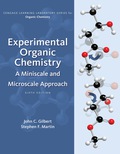
(a)
Interpretation:
Most polar phase should be identified from mobile phase and stationary phase in reverse phase column chromatography.
Concept Introduction :
Column chromatography is a large scale solid-liquid adsorption chromatographic technique that can separate multi-gram amounts of mixtures. This is a preparative version of thin layer chromatography that permits separation and isolation of products by collection of eluted fractions.
There are two types of column chromatography named as normal phase-column chromatography and reverse − phase column chromatography.
(b)
Interpretation:
Reverse-phase chromatography is more appropriate in separating peptides than normal-phase chromatography should be explained.
Concept Introduction :
Column chromatography is a large scale solid-liquid adsorption chromatographic technique that can separate multi-gram amounts of mixtures. This is a preparative version of thin layer chromatography that permits separation and isolation of products by collection of eluted fractions.
There are two types of column chromatography named as normal phase-column chromatography and reverse − phase column chromatography.
Trending nowThis is a popular solution!

Chapter 6 Solutions
EBK EXPERIMENTAL ORGANIC CHEMISTRY: A M
 EBK A SMALL SCALE APPROACH TO ORGANIC LChemistryISBN:9781305446021Author:LampmanPublisher:CENGAGE LEARNING - CONSIGNMENT
EBK A SMALL SCALE APPROACH TO ORGANIC LChemistryISBN:9781305446021Author:LampmanPublisher:CENGAGE LEARNING - CONSIGNMENT Principles of Instrumental AnalysisChemistryISBN:9781305577213Author:Douglas A. Skoog, F. James Holler, Stanley R. CrouchPublisher:Cengage Learning
Principles of Instrumental AnalysisChemistryISBN:9781305577213Author:Douglas A. Skoog, F. James Holler, Stanley R. CrouchPublisher:Cengage Learning


